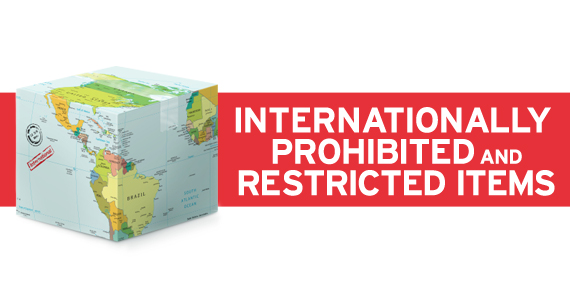 Packing up that antique camera to send to a Chinese customer, or a lovely vintage lace pillowcase to Australia? Not so fast! Did you know these and many other seemingly innocuous (and not so innocuous) items are prohibited from being imported into many countries? If not, now’s the time to learn about how to find out what’s prohibited or restricted, and the ramifications you may face for not being on top of these regulations.
Packing up that antique camera to send to a Chinese customer, or a lovely vintage lace pillowcase to Australia? Not so fast! Did you know these and many other seemingly innocuous (and not so innocuous) items are prohibited from being imported into many countries? If not, now’s the time to learn about how to find out what’s prohibited or restricted, and the ramifications you may face for not being on top of these regulations.
The Basics
Lawmakers of most countries deem certain items prohibited (meaning they are forbidden by law to be sold or exported from the United States to the destination country) or restricted (requiring special permits or licenses for the sale or export of these items into the country). Some of these items are no-brainers – for example, if they’re a threat to public safety, community health, plant or animal life, or defeat a country’s national interests. As an e-Commerce seller, you probably aren’t dealing in weapons or live animals – but your own products could fall under these rules because they’re deemed detrimental to a country’s economic health, as well as other less salacious reasons.
What Do e-Commerce Sellers Need to Know?
As an e-Commerce seller, you’re responsible for making sure you’re not shipping prohibited or restricted items. Just because it’s legal to sell in the United States doesn’t mean it’s legal for your international customers to purchase. Many marketplaces, like Amazon and eBay, assist sellers in this matter by providing updated lists of these items, and it’s easy to check on sites like USPS, UPS and FedEx. Shipping software such as Stamps.com also includes the restrictions for every country right into their program.
Still, buyers may still go through with an order, with or without knowing their country’s restrictions. That’s why it’s important to pay attention. If you don’t double-check, it’s likely the product could be seized in Customs and destroyed – in which case you’ll be liable for the price the buyer paid, plus the shipping costs … and you won’t even get the item back to resell. See why it pays to be vigilant?
Examples of Prohibited and Restricted Items
Different countries’ prohibited and restricted items may surprise you! Here’s a quick look at some products that may not automatically raise a red flag to sellers; please keep in mind that this list is in no way exhaustive and does change.
Australia
- Prohibited: Toy guns
- Restricted: Glazed pottery/Ceramics used for tableware and cooking
Brazil
- Prohibited: Playing cards
- Restricted: Watches
Ireland
- Prohibited: Straw hats
- Restricted: Silk and Woven fabrics
Mexico
- Prohibited: Jewelry
- Restricted: Beauty Products and Cosmetics
Norway
- Prohibited: Pharmaceutical products of any kind
- Restricted: Radio and telecommunications equipment
Again, remember this is an extremely small sampling of countries and items of note.
Truth and Consequences
Why is it so important to make sure your items can be shipped to your international customers? Simply put – so your customers don’t have to! Providing this knowledge saves time and hassle, and puts your customer-service level a notch above sellers who don’t take this important step. Otherwise you’ll encounter unhappy customers who don’t get the order they expected, plus potential negative feedback on top of your loss of revenue.
Keeping Up with Changes to Prohibited and Restricted Items
Of course, the list of prohibited and restricted items changes frequently, often in response to world events. For example, when the bird flu became widespread several years ago, many countries placed feathers and items made with feathers on their prohibited or restricted lists. It may have been easy to dismiss this rule as not applicable to your business … unless, perhaps, you create jewelry featuring peacock feathers, or down-stuffed pillows!
The Bottom Line
Don’t risk your merchandise and business reputation over shipping SNAFUs involving prohibited and restricted items. Doing your homework will ensure your goods find their way legally and safely into the right customers’ hands.



![[Infographic] 2014 Guide to Holiday Shipping Carrier Changes & “Ship By” Schedules](https://www.ecommerceweekly.com/wp-content/uploads/2014/11/204771_ShipStation-Holiday-Shipping-Cut-off-Infographic3_150x150.jpg)


